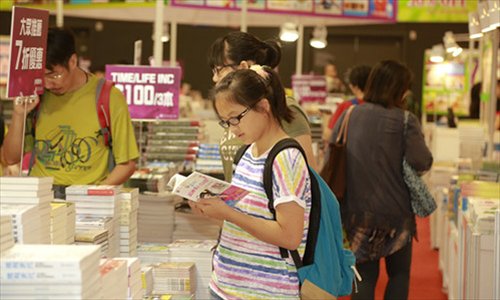HK book fair blahs
By Li Jingjing Source:Global Times Published: 2013-7-30 19:18:02

Readers scan books at the Hong Kong Book Fair on opening day. Photo: IC
Among many physical and online bookstores' top 10 bestselling books, Insight written by CCTV hostess Chai Jing, and Tiny Times, written by "post-80s generation" Chinese writer Guo Jingming, have been holding a place for quite a long time. Not to mention the great demand for works by Mo Yan, who won the Nobel Prize for Literature in 2012.However, in contrast to the high sales seen in the Chinese mainland, these popular works encountered an unexpected snub at the Hong Kong Book Fair, which was held at the Hong Kong Convention and Exhibition Center from July 17 to 23.
According to media reports, few people at the book fair visited the independent exhibition area of Mo Yan's works. And Guo's works, which caused a buzz over the past few months in the mainland because of its adapted movie, had no accompanying promotional material.
If the book fair is an accurate reflection of the current situation between the mainland and Hong Kong, Macao and Taiwan, then it is obvious that the exchange of literature requires more than converting between simplified and traditional Chinese characters.
Current situation
Exchanges like this are nothing new. Rye Field Publishing Company in Taiwan is a major publishing house dedicated to bringing mainland literature to these regions. They have been publishing Mo Yan's works for more than 10 years.
Lin Xiumei, the deputy editor-in-chief at Rye Field told the Global Times that overall sales of mainland writers' works are not particularly good in Taiwan, especially those from the post-80s generation. But amid the tepid response from the market, serious literature performs better. "Writers like Mo Yan, Yu Hua - they are already really successful and famous writers in the mainland. Their works tell stories about parts of society that most readers are not familiar with, [and thus] their books are welcomed here," she said.
Besides serious works, books on Chinese history are also popular. Books by Wang Liqun and Yi Zhongtian, both of whom are scholars and well-known for interpreting Chinese historical stories, perform well outside the mainland.
"People here are interested in knowing more about Chinese history, and they feel close to it," Lin said.
But the cold response felt in Hong Kong is a two-way street. While mainland literature received a lukewarm response from Hong Kong and Taiwan, popular literature from those regions have generally failed to generate excitement in the mainland market as well.
The deputy editor-in-chief of Shanghai Literature and Art Publishing House, Cao Yuanyong, told the Global Times his company was one of the earliest to introduce literature from Hong Kong and Taiwan a decade ago. After being stopped for a while, they reintroduced works from those areas a few years ago.
"Their current situation is just like what we call 'second-line works' in the market - not bad, but not good either," Cao said.
He also expressed it is a normal phenomenon for those works to not have a high sales rate. The first and most practical reason is that their population base is so much smaller than the mainland. Secondly, serious literature has a relative poorer performance than popular books in the market.
Cultural divide
The different cultural environments between the mainland and Hong Kong, Macao and Taiwan result in different writing styles as well as reading habits.
Lin said that authors from Taiwan tend to write about current life and society, and therefore, books by writers of the mainland's "post-80s generation" don't resonate with audiences there. Taiwan readers choose local writers' works if they want to read about modern life. However, Lin mentioned that Tiny Times saw an increase in sales due to the adapted movie.
Another fact is that "Taiwan readers prefer to choose overseas works from Japan or Western countries. This is a long-standing reading habit," she said.
They have introduced a substantial number of mainland works in recent years, as long as they felt those works were worthy, and it is not hard for them to cooperate with writers. However, when they try to introduce Taiwan literature into the mainland, they experience many restraints due to the complex censorship process. "The exchange is not balanced," said Lin.
In order to break those barriers and trigger more mutual understanding in literature, Cao Yuanyong said that "carrying out more literary exchange activities between these areas is the main method and a necessity."
It is important to emphasize the internationalization of writing styles. The success of Mo Yan offers a perfect example: When a writer reaches a level of international recognition, unfamiliarity with the area in which the work was created would not be an obstacle for readers outside the area.
Posted in: Books